Russia’s defence ministry recently made headlines as it signed a significant contract with the Akhmat group of Chechen special forces. This paramilitary group, actively involved in the Kremlin’s offensive near the town of Mariinka in the Donetsk region of eastern Ukraine, will now come under the control of the country’s Defence Minister Sergei Shoigu.
This move is in accordance with a new Russian law aimed at regulating and managing private armies fighting on Moscow’s behalf in Ukraine. In this article, we will explore the implications of this contract and its potential impact on the ongoing conflict.
Controlling Private Armies in Ukraine:
The contract signed between Russia’s defence ministry and the Akhmat group is part of a broader initiative to control private armies operating in Ukraine. In line with a new law, all “volunteer units” involved in the conflict are required to sign contracts by July 1, effectively bringing them under the authority of Defence Minister Sergei Shoigu.
This measure aims to streamline the operations of these groups and ensure better coordination with the Russian military.
According to the Kremlin, volunteer fighters who agree to abide by the rules of the defence contract will receive the same benefits as regular troops.

Equal Benefits for Volunteer Fighters:
According to the Kremlin, volunteer fighters who agree to abide by the rules of the defence contract will receive the same benefits as regular troops.
This provision aims to incentivize these individuals to formalize their roles and align their actions with the Russian military’s objectives. The move not only helps integrate these fighters into the existing command structure but also enhances their support and welfare.
Over the past 15 months, the Akhmat group claims to have prepared and sent tens of thousands of volunteers to Ukraine.
Akhmat Group’s Acceptance and Past Involvement:
Following the announcement of the contract, Apty Alaudinov, commander of the Akhmat group, expressed his satisfaction with the development. Akhmat’s leader, Ramzan Kadyrov, accepted the offer, highlighting the group’s previous contributions to the conflict.
Over the past 15 months, the Akhmat group claims to have prepared and sent tens of thousands of volunteers to Ukraine. Their involvement has primarily been in areas behind the front line after participating in intense battles in cities such as Mariupol, Severodonetsk, and Lysychanak.
Shift in Role for Chechen Fighters:
As per a report by the Institute for the Study of War (ISW), Chechen fighters have predominantly operated in areas behind the front line.
However, due to intensified fighting in Russia’s Belgorod, it is speculated that Kadyrov’s troops have been directed to assume a more prominent role in the conflict.
This shift in responsibility underscores the significance of the contract signed between the Chechen special forces and Russia’s defence ministry.
Prigozhin’s Opposition and Future Prospects:
While the Akhmat group embraced the defence ministry’s offer, Yevgeny Prigozhin, the chief of Russia’s Wagner group of private mercenaries, refused to sign a similar contract.
Prigozhin’s units have been known for their independent operations, and he has expressed disdain towards Moscow’s military leadership in the past.
Nevertheless, the hope remains that more volunteer units will follow the Chechen special forces’ example and enter into formal contracts with the defence ministry.
While the Akhmat group embraced the defence ministry’s offer, Yevgeny Prigozhin, the chief of Russia’s Wagner group of private mercenaries, refused to sign a similar contract.
Conclusion:
Russia’s defence ministry’s contract with the Akhmat group of Chechen special forces marks a significant step towards controlling and regulating private armies operating in Ukraine.
By requiring volunteer units to sign contracts and fall under the command of Defence Minister Sergei Shoigu, the Russian government aims to enhance coordination and streamline military operations. It remains to be seen how this development will influence the dynamics of the conflict in the Donetsk region and beyond.
The presence of private armies in Ukraine has raised concerns regarding the lack of accountability, coordination, and adherence to international norms.
Background of Controlling Private Armies in Ukraine:
The conflict in Ukraine has been marked by the involvement of various private armies and paramilitary groups fighting on behalf of different actors.
These private armies, comprised of volunteers and mercenaries, have played a significant role in the fighting, often operating independently and outside the command structure of regular armed forces.
The presence of private armies in Ukraine has raised concerns regarding the lack of accountability, coordination, and adherence to international norms.
Their actions have occasionally resulted in human rights violations, escalation of violence, and destabilization of the region. To address these issues, efforts have been made to regulate and control the activities of private armies involved in the conflict.
The Russian government, which has been accused of supporting separatist forces in eastern Ukraine, has taken steps to bring these private armies under its control. In line with a new law, volunteer units involved in the conflict are required to sign contracts, bringing them under the authority of the Russian Defence Ministry.
This measure aims to streamline operations, enhance coordination with regular armed forces, and ensure compliance with the rules of engagement.
Controlling private armies in Ukraine is seen as a crucial step towards stabilizing the region and finding a diplomatic resolution to the conflict. By subjecting these groups to a formal command structure, it becomes possible to monitor their actions, prevent potential abuses, and establish clearer lines of responsibility.
Furthermore, it allows for better coordination between private armies and regular armed forces, reducing the risk of conflicting objectives or unintended escalation.
Think tanks, such as the Institute for the Study of War (ISW) mentioned earlier, play a significant role in analyzing the implications of controlling private armies in Ukraine.
They provide insights into the effectiveness of these measures, the potential impact on the conflict dynamics, and the overall prospects for peace and stability in the region.
Through their research and analysis, think tanks contribute to shaping policies and strategies aimed at managing private armies and finding a sustainable resolution to the conflict in Ukraine.




